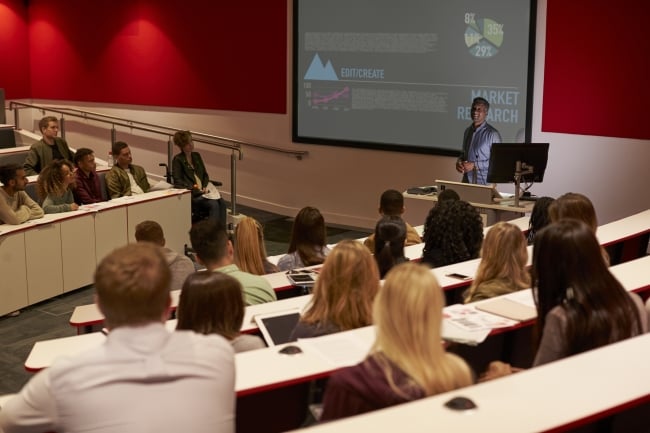You have /5 articles left.
Sign up for a free account or log in.

To better prepare students for their careers after college, faculty members and campus leaders are prioritizing education on generative artificial intelligence tools and features.
monkeybusinessimages/iStock/Getty Images
Generative artificial intelligence (AI) has been one of the most disruptive technologies in recent years. In fulfilling higher education’s mission to equip students with lifelong skills and learning, faculty members across disciplines are including AI tools in their classrooms.
Inside Higher Ed’s most recent survey of chief academic officers and provosts found 14 percent have reviewed the curriculum to ensure it will prepare students for AI in the workforce and an additional 73 percent plan to do so. Among students, 72 percent of respondents to a winter 2023 Student Voice survey by Inside Higher Ed and College Pulse believe their institution should be preparing them “a lot” or “somewhat” to use AI in the workplace.
Among the possibilities of how generative AI can improve learning for students, faculty members have embedded AI in student supports, as course topics and as research tools.
By the Numbers
AI skills were requested in 2 percent of job postings in the U.S. in 2023, according to 2023 analysis by Lightcast. Generative AI is a less in-demand skill, ranking behind machine learning and robotic systems skill, but many higher education leaders see it as a skill for future-proofing students’ degrees.
The majority of students haven’t latched on to generative AI for personal or academic use. As of November 2023, one survey found just over one-third of students in the U.S. say they’re using these tools monthly and another found 20 percent are using AI for coursework.
AI as a teaching tool: One of the most common ways faculty are utilizing AI is to enhance current learning outcomes.
Chatbots are not new AI tools, but generative AI expands the opportunities available to faculty in automated messaging with learners.
Sanghoon Park, a professor of teaching and learning at the University of South Florida, created a chatbot that uses AI to provide motivational messages to students in his online class. The chatbot is connected to the online course page and students can receive academic help and emotional support in a few clicks from the bot.
Similarly, the University of Georgia, Morgan State University and the University of Central Florida will deploy chatbot technology into first-year math and English classes starting in fall 2024 as part of a Department of Education grant program to study the role of chatbots on student outcomes. The chatbots will answer questions about course material, remind students of upcoming assignments as well as provide motivational support.
Students at Hult International Business School and Columbia University are exposed to generative AI through an online digital-marketing simulation. In the game, students can interact with customer personas who are powered by AI to make smarter decisions in their campaigns.
AI as a course topic: Other faculty are engaging with technology directly in the classroom, teaching students how to hone and develop their own AI tools and projects.
A fall 2023 course at the University of Mary Washington taught students how to utilize ChatGPT and generative AI, as well as the challenges and possibilities they pose. The special topics course in digital studies was taught by Anand Rao, professor of communication and chair of the department of communication and digital studies.
Students built their own generative AI tools, using low- and no-code options including edtech platform PlayLab, which helps users create AI chatbots.
American University’s Kogod School of Business announced in March that, starting fall 2024, it would update all curriculum to teach students prompt engineering and programming as well as coding in R, Python and AI/ML models. Course content will vary from using AI in real-world contexts to application in abstract and theoretical manners.
Incoming students will also be required to complete AI courses and workshops as part of the undergraduate core curriculum.
Georgia Tech’s College of Engineering is reimagining course offerings to strengthen artificial intelligence and machine learning education at the university, with six new courses launched in spring 2024. Most of the courses are major-specific, including how to use AI in civil and environmental engineering or bioinformatics, but others are more general, including decision and data analytics.
AI in research: As artificial intelligence tools develop, researchers at Cornell University expect AI to be part of the toolbox of the next generation of researchers, therefore professors should be prepared to engage and lead thoughtful discussions around AI.
Officials at the university also believe it is critical to establish clear policies around using tools in research to protect researchers’ privacy and uphold ethical practices.
Boston University is piloting an initiative to understand how students in a first-year writing course partner with AI in writing and research and to inform program guidelines in the future. The goal is to provide best practices for faculty in teaching ethical and responsible AI use as well as to develop assignments and activities to better teach these concepts.
How is your college or university employing AI in the classroom? Tell us about it here.








